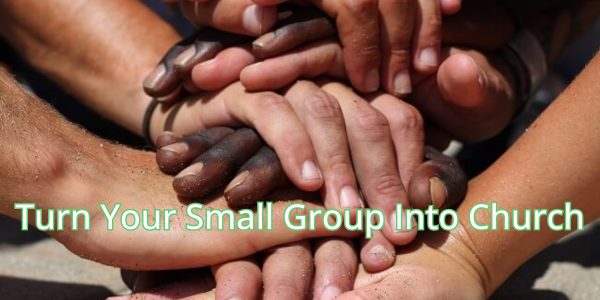by Austin Maxheimer
If you have ever been to small group leader training, chances are you have received coaching on creating ownership of your group by divvying up roles:
“You take prayer requests. You can keep track of attendance and communication. Stacy, you like having fun, coordinate some social events for us. Jack, you are passionate about community service and know how to fix things, come up with a service project for us once a quarter. And who wants the snack schedule?”
I understand this. Heck, I’ve led group leader trainings that taught people to create ownership in this way. It is just what small groups do! But there is one glaring problem with this approach—it is all for internal consumption by the group. Even the one externally focused role (quarterly service projects) functions more as a checklist to mark off a perceived Christian duty.
Internal building up of community is good and important, but it cannot be the end goal of Christian small groups. Jesus’ times of retreat and teaching-equipping with his disciples were so they could be sent out to be about the purposes of God. Shouldn’t our groups look drastically different from other social groupings? We are called to be the body of Christ, living and active in the world, not a souped-up party planning team with prayer.
What is remarkable is how little attention is given to the roles the Apostle Paul lays out in his letter to the church at Ephesus:
And he gave the apostles, the prophets, the evangelists, the pastors and teachers, to equip the saints for the work of ministry, for building up the body of Christ…we are to grow up in every way into him who is the head, into Christ, from who the whole body, joined and held together by every joint with which it is equipped, when each part is working properly, makes the body grow so that it builds itself up in love. – Ephesians 4:11-12, 15-16
In Building a Discipling Culture, author Mike Breen talks about how we are to step into these offices of the church, not that they are our identity. It is not that we are Apostles, Evangelists, Teachers, etc.—that identity belongs to Christ—but that we fill the role through grace in order to build up the body of Christ. And did you see what the fruit of people functioning in these roles are?
- Growth in Christ
- Good doctrine
- Love for one another
- Sustaining against the storms of life
- Mission (mutual working)
- Unity of faith
In other words, everything we want to see as church leaders. The question becomes then, why would we ever deviate from a described methodology found in Scripture to assign roles that create to-do lists?
What if instead of creating a prayer list of requests, you helped one another understand what the role of the office of Prophet is and how it functions?
What if Stacy began to understand that she wasn’t a social events coordinator but that God had designed her to fulfill the role of Shepherd for the people of God?
What if Jack saw his works of service as Evangelism and that he was helping others proclaim the Good News of Jesus when he helped fix up a house?
Instead of giving them tasks to do, they are released into leadership of that role in your group—whatever it may look like—with the charge to pursue the building up of the body to be on mission in your community. In this manner, you have a whole group of ecclesiological entrepreneurs! That is real, lasting ownership.
Your job as a leader then is to simply support, align, and occasionally redirect toward the Mission of God. This may seem like a pipe dream or an unclimbable mountain—and there are certainly things that need to come before, like relationship building and identity formation in Christ—BUT, I would much rather fail allowing others to live in the fullness of who Christ has called His Church to be than to assign one more snack schedule maker.
Here’s a helpful free tool to discover the APEST (Apostles, Prophets, Evangelists, Shepherds, and Teachers) in your group: Fivefold Ministries Tool



